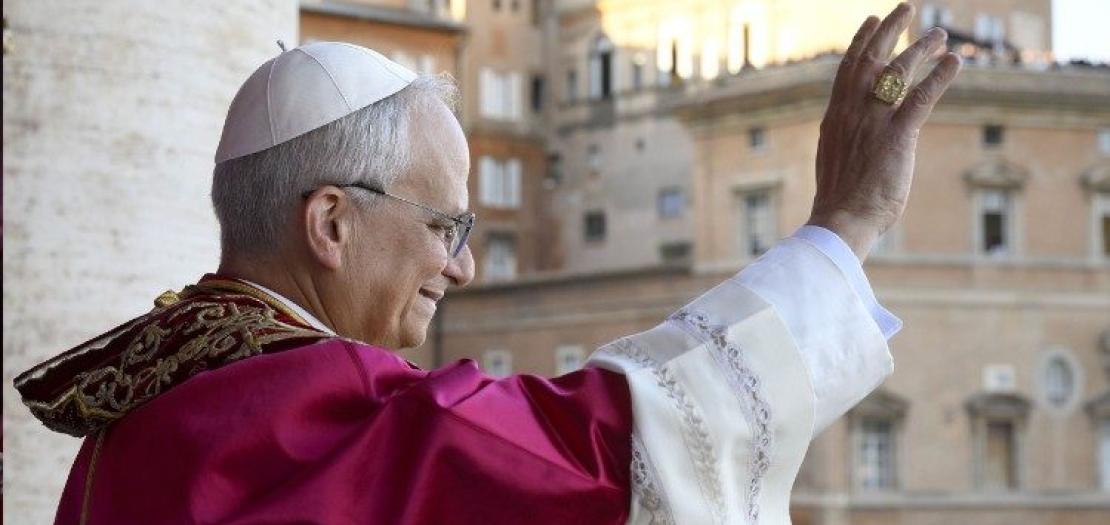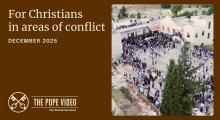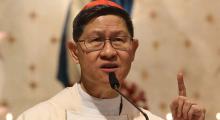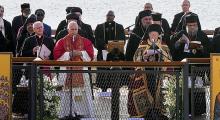Issued by the Catholic Center for Studies and Media - Jordan. Editor-in-chief Fr. Rif'at Bader - موقع أبونا abouna.org

Pope Leo XIV greets pilgrims gathered in St Peter's Square during his first appearance at the Loggia delle Benedizioni on 8 May 2025
Six months have passed since that afternoon of May 8 when the new Bishop of Rome—the first American and first Augustinian pope—appeared at the Central Loggia of St Peter’s Basilica. A common thread runs through his magisterium: a Church that is a sign of unity and communion, becoming leaven for a world in need of reconciliation in the midst wars, hatred, and violence. Beyond analyses of continuity and discontinuity with his predecessor (a natural feature of every pontificate), it is worth revisiting some key moments in this magisterium, which shows how proclamation of the essentials of faith is never separated from the witness of charity and concrete commitment to the least among us, and to building a more just society. From his very first words, spoken in the greeting immediately after his election:
"Peace be with you all! […] It is the peace of the risen Christ. A peace that is unarmed and disarming, humble and persevering. A peace that comes from God, the God who loves us all, unconditionally. […] We must seek together how to be a missionary Church, a Church that builds bridges, dialogue, always open to welcome".
A Church, he said in his homily for the inauguration of the pontificate on 18 May 2025, that is united, “a sign of unity and communion, which becomes a leaven for a reconciled world".
"In this our time, we still see too much discord, too many wounds caused by hatred, violence, prejudice, the fear of difference, and an economic paradigm that exploits the Earth’s resources and marginalises the poorest. For our part, we want to be a small leaven of unity, communion and fraternity within the world.”
At the heart of mission: Disappearing so that Christ remains
The day after his election, in his first celebration with the cardinals in the Sistine Chapel, Pope Leo XIV recalled an “an indispensable commitment for all those in the Church who exercise a ministry of authority. It is to move aside so that Christ may remain, to make oneself small so that he may be known and glorified (cf. Jn 3:30), to spend oneself to the utmost so that all may have the opportunity to know and love him.”
In his homily of 18 May, the Pope spoke of “love and unity” as the two dimensions of the task entrusted by Jesus to Peter, and explained that this task is possible only because Peter’s own life was “was touched by the infinite and unconditional love of God, even in the hour of his failure and denial.” For, as he told the young people gathered at Tor Vergata on the evening of 2 August, “Our existence did not originate from our decision, but from a love that wanted us.”
This love precedes us, as the Pope explained in the catechesis at the General Audience of 20 August, speaking of Judas receiving the morsel from Jesus at the Last Supper: “Jesus carries his love forward and to its depths […] He knows that true forgiveness does not await repentance, but offers itself first, as a free gift, even before it is accepted.”
The Church’s mission is to witness to this love. To do so, Pope Leo explained on 7 June 2025 during the Pentecost Vigil, “we have no need of powerful patrons, worldly compromises, or emotional strategies. Evangelization is always God’s work. If at times it takes place through us, it is thanks to the bonds that it makes possible.” The Church needs neither an exchange of favours with the world nor marketing strategies based on emotions or excessive protagonism. Evangelization is God at work.
Fundamental to mission is unity in diversity—lived communion. It is a faith that, as he emphasized on 5 October 2025 during the Jubilee of the Missionary World, “does not impose itself by means of power and in extraordinary ways".
"Indeed, it is enough to have faith the size of a mustard seed in order to do unimaginable things (cf. Lk 17:6), because it carries within it the strength of God’s love that opens the way to salvation. This is a salvation that is fulfilled when we take responsibility and, with the compassion of the Gospel, care for the suffering of others.”
The faith proposed by Pope Leo XIV in the homily of 29 June is attentive to “falling into a rut, a routine, a tendency to follow the same old pastoral plans without experiencing interior renewal and a willingness to respond to new challenges”, and that can lead to “openness to change, to new events, encounters and concrete situations in the life of their communities, and by their readiness to consider new approaches to evangelization in response to the problems and difficulties raised by our brothers and sisters in the faith.”
It is a faith that does not judge others nor make us feel “perfect,” because, as he explained at the Angelus of 24 August, Jesus calls into question “the security of believers”:
Jesus “tells us that it is not enough to profess the faith with words, to eat and drink with Him by celebrating the Eucharist or to have a good knowledge of Christian doctrine. Our faith is authentic when it embraces our whole life, when it becomes a criterion for our decisions, when it makes us women and men committed to doing what is right and who take risks out of love, even as Jesus did.”
Christians, the Pope said at the General Audience of 3 September, are witnesses of a God who on the Cross “does not appear as a victorious hero, but as a supplicant for love."
"He does not proclaim, condemn or defend himself. He humbly asks for what he, alone, cannot give to himself in any way. […] This is the Christian paradox: God saves not by doing, but by letting himself do. Not by defeating evil with force, but by accepting the weakness of love to the very end. On the cross, Jesus teaches us that man does not realize himself in power, but in trustful openness to others, even when they are hostile and enemies."
Witnessing to peace
After doing so in his first greeting on the day of his election, Pope Leo XIV has continued to speak often of peace, inviting Christians to witness to it concretely: “Non-violence, as a method and a style, must distinguish our decisions, our relationships and our actions,” he said on 30 May to movements and associations associated with the “Arena of Peace.” Speaking with the Italian bishops on 17 June 2025, he expressed his hope “that every diocese may promote pathways of education in non-violence, mediation initiatives in local conflicts, and welcoming projects that transform fear of the other into an opportunity for encounter.”
At the same time, the Successor of Peter has repeatedly raised his voice against rearmament, as he did at the end of the General Audience of 18 June: “We must never get used to war! Indeed, the temptation to have recourse to powerful and sophisticated weapons needs to be rejected.”
Pope Leo XIV spoke of fake news used as a pretext for preventive attacks or to kindle new wars, as he did on 26 June, receiving participants of ROACO, the Assembly for Aid to the Eastern Churches:
"All of us, by virtue of our humanity, are called upon to examine the causes of these conflicts, to identify those that are real and to attempt to resolve them. But also to reject those that are false, the result of emotional manipulation and rhetoric, and to make every effort to bring them to light. People must not die because of fake news."
In that same address, we also find this passage, characterized by realism and a sense of history that many today seem to have forgotten:
"After centuries of history, how can anyone believe that acts of war bring about peace and not backfire on those who commit them? […] How can we continue to betray the desire of the world’s peoples for peace with propaganda about weapons buildup, as if military supremacy will resolve problems instead of fueling even greater hatred and desire for revenge? People are beginning to realize the amount of money that ends up in the pockets of merchants of death; money that could be used to build new hospitals and schools is instead being used to destroy those that already exist!"
The disarmament called for by the Bishop of Rome concerns not only leaders of nations—who are asked to not turn wealth “against the human person, transforming it into weapons that destroy peoples and into monopolies that humiliate workers” (homily of 21 September in the parish of St Anne in the Vatican)—but also each one of us, because when Jesus’ invitation to disarm the hand begins with the call to disarm the heart. As Pope Leo said at the end of the Marian Vigil for Peace on 11 October 2025:
“Lay down your sword” is a message addressed to the powerful of this world, to those who guide the fate of peoples: have the courage to disarm! At the same time, it is an invitation to each one of us to recognize that no idea, faith or policy justifies killing. We must first disarm our hearts because unless we have peace within ourselves, we cannot give it to others.
It is an invitation “to adopt a different perspective, to look at the world from a lower position: through the eyes of those who suffer rather than the mighty.”
On 10 October, in his address to Aid to the Church in Need, Pope Leo also explained, quoting Pope Francis, that “there can be no peace without freedom of religion, freedom of thought, freedom of expression and respect for the views of others.”
Love for the poor
In his first Apostolic Exhortation, Dilexi te, published on 9 October, Pope Leo explained that helping those who suffer “is not a matter of mere human kindness but a revelation: contact with those who are lowly and powerless is a fundamental way of encountering the Lord of history.” Love for the poor is not “optional but a requirement of true worship.”
"The fact that some dismiss or ridicule charitable works, as if they were an obsession on the part of a few and not the burning heart of the Church’s mission, convinces me of the need to go back and re-read the Gospel, lest we risk replacing it with the wisdom of this world."
And “all the members of the People of God have a duty to make their voices heard, albeit in different ways, in order to point out and denounce such structural issues, even at the cost of appearing foolish or naïve.”
Pope Leo explained, in the catechesis of 28 May, that “the practice of worship does not automatically lead to being compassionate. Indeed, before being a religious matter, compassion is a question of humanity! Before being believers, we are called to be human.”
Meeting with Apostolic Nuncios on 10 June 2025, the Pope said:
"I am counting on you so that in the countries where you live, everyone may know that the Church is always ready for everything out of love, that she is always on the side of the last, the poor, and that she will always defend the sacrosanct right to believe in God. […] Only love is worthy of faith, in the face of the suffering of the innocent, the crucified of today […]"
And on 13 July, from Castel Gandolfo, he invited the faithful—following the example of the Good Samaritan—not to “pass by,” but to allow our hearts to be “pierced” by “all those who descend into sin, suffering and poverty,” by “all those peoples that are stripped, robbed and pillaged, victims of tyrannical political systems, of an economy that forces them into poverty, and of wars that kill their dreams and their very lives.”
He described the works of mercy, as he did on 10 August at the Angelus, as “the most secure and profitable bank where we can entrust the treasure of our existence […] In the family, parish, school or workplace, we should try not to miss any opportunity to act with love.”
At the Jubilee of Justice on 20 September, the Pope urged us not to turn our gaze away from “the reality of so many countries and peoples who “hunger and thirst for justice” because their living conditions are so inequitable and inhuman as to be unacceptable” reminding all that “a State without justice is not a State.”
Speaking to Popular Movements on 23 October 2025, the Successor of Peter recalled that today “exclusion is the new face of social injustice.
"The gap between a ‘small minority’—1 per cent of the population—and the overwhelming majority has widened dramatically. […] As a Bishop in Peru, I am happy to have experienced a Church that accompanies people in their sorrows, in their joys, in their struggles and in their hopes. This is an antidote to the spreading structural indifference that does not take seriously the drama of people who are stripped, robbed, sacked and reduced to poverty."
Migrants, Our Brothers and Sisters
Pope Leo XIV, in the homily for the Jubilee of the Missionary World and of Migrants on 5 October, spoke of “the story of so many of our migrant brothers and sisters […]
"The tragedy of their flight from violence, the suffering which accompanies it, the fear of not succeeding, the perilous risk of traveling along the coastline, their cry of sorrow and desperation. Brothers and sisters, those boats which hope to catch sight of a safe port, and those eyes filled with anguish and hope seeking to reach the shore, cannot and must not find the coldness of indifference or the stigma of discrimination!"
And in his address to the Popular Movements on 23 October, he spoke of the topic of security:
"States have the right and the duty to protect their borders, but this should be balanced by the moral obligation to provide refuge. With the abuse of vulnerable migrants, we are witnessing, not the legitimate exercise of national sovereignty, but rather grave crimes committed or tolerated by the state. Ever more inhumane measures are being adopted — even celebrated politically — that treat these “undesirables” as if they were garbage and not human beings. Christianity, on the other hand, refers to the God who is love, who creates us and calls us to live as brothers and sisters."
Conversion to Care for Creation
The Pope has spoken many times about care for Creation, following in the footsteps of the encyclical Laudato sí of his predecessor Francis, as he did on 9 July, introducing the “Mass for Creation”:
"At the beginning of Mass, we prayed for conversion, our own conversion. I would like to add that we should pray for the conversion of the many people, inside and outside the Church, who do not yet recognize the urgent need to care for our common home. The many natural disasters we see occurring almost daily in our world, in so many places and countries, are also in part a result of the excesses of human beings and our lifestyles. We need to ask whether we ourselves are undergoing that conversion. How much we need it!"







